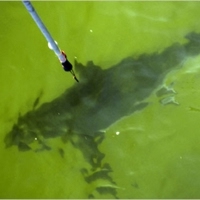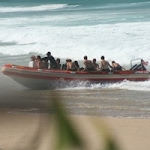As Chatham officials announced they were closing all of the town’s East
Side beaches, state marine biologists were pulling off the high-tech
accomplishment out on the ocean.
The first shark was tagged at 9 a.m. near the southern tip of Monomoy
Island, off Chatham. A second was tagged at 3:30 p.m. about a mile north
of the first - each with a single move. A third was also spotted but
not tagged. “They were right around a 1,000 pounds apiece,’’ said
Chaprales, a 58-year-old tuna fisherman and lobsterman from Marstons
Mills, a village in Barnstable.
Chaprales said he had worked with biologists at the New England Aquarium
years ago to tag other species of sharks and bluefin tuna. “We’ve done
this before,’’ he said. “It doesn’t hurt the sharks.’’ The tagging
occurred days after officials set out to identify the species of five
sharks seen about a mile off Monomoy Island last week. As of yesterday,
marine scientists had identified three great white sharks in that area.
The tagging marked a major high-tech accomplishment for state marine
biologists.
Though other types of fish have been tagged with pop-up satellite
devices like those used yesterday, this was the first time biologists
used those tags to study the movements of the great white in these
waters, Skomal said. The tags are programmed to pop off the two sharks
on Jan. 15 and rise to the water’s surface. Data gathered until then
will be transmitted via satellite to Skomal, who will track the animals’
movements.
Skomal calls the device “the latest and greatest’’ technology in tagging
great whites and said it that will provide data such as the depth and
temperature of the water in which they travel.
Skomal and his team - an assistant at the state’s Division of Marine
Fisheries, a graduate student, and Chaprales - headed out on the ocean
at around 8 yesterday morning. Pilot George Breen of Falmouth aided in
the search, hovering above in a spotter plane. Chaprales’s son, Nick,
drove the fishing vessel, the Ezduzit.
Diving is an adventurous sport
Diving is an adventurous sport. Interaction with marine animals is the
greatest thrill. Sharks, most of which are harmless, strike fear into
the majority of people – but there are also divers who love them and
will do anything to see the larger ones in their natural environment.
Are you one of “them” and dig shark-diving? So do we! Welcome to Shark
Society, the underwater adventures provider with great places to go
scuba diving, a great team to assist and guide you, several shark-diving
locations worldwide. We are glad to share our knowledge about sharks
with you and make your vacation with shark scuba diving an unforgettable
shark-diving adventure.
For the scuba-diving novice that “surfs” into our website:
Scuba diving is a excellent recreational activity, scuba diving with sharks is in no way different. Shark-diving is, in our opinion, just as safe like regular scuba-diving: stay within the rules, respect the sharks and their natural habitat, educate yourself about shark-diving, listen to the experienced shark-divers and you are in for a very special treat. Scuba diving with predatory sharks, one of the most fascinating creatures in existence,has been described by many participating divers as a thrilling and strangely,at the same time, an emotionally moving experience!
For the scuba-diving novice that “surfs” into our website:
Scuba diving is a excellent recreational activity, scuba diving with sharks is in no way different. Shark-diving is, in our opinion, just as safe like regular scuba-diving: stay within the rules, respect the sharks and their natural habitat, educate yourself about shark-diving, listen to the experienced shark-divers and you are in for a very special treat. Scuba diving with predatory sharks, one of the most fascinating creatures in existence,has been described by many participating divers as a thrilling and strangely,at the same time, an emotionally moving experience!
Great White Shark
The legendary great white shark is far more fearsome in our imaginations than in reality. As scientific research on these elusive predators increases, their image as mindless killing machines is beginning to fade.
Of the 100-plus annual shark attacks worldwide, fully one-third to one-half are attributable to great whites.
However, most of these are not fatal, and new research finds that great whites, who are naturally curious, are "sample biting" then releasing their victims rather than preying on humans.
It's not a terribly comforting distinction, but it does indicate that humans are not actually on the great white's menu.
Great whites are the largest predatory fish on Earth. They grow to an average of 15 feet (4.6 meters) in length, though specimens exceeding 20 feet (6 meters) and weighing up to 5,000 pounds (2,268 kilograms) have been recorded.
They have slate-gray upper bodies to blend in with the rocky coastal sea floor, but get their name from their universally white underbellies.
They are streamlined, torpedo-shaped swimmers with powerful tails that can propel them through the water at speeds of up to 15 miles (24 kilometers) per hour. They can even leave the water completely, breaching like whales when attacking prey from underneath.
Mozambique Scuba
Mozambique offers pristine beaches, warm waters and unspoiled reefs. Scuba diving here is truly world class. Mozambique has steadily established itself as one of the top dive destinations in the world. Divers come to Mozambique to swim with the giant Whale sharks that frequent the waters of this beautiful coastline.
The small town of Praia do Tofo (pronounced Torfu) is the home the of largest concentration of Whale sharks in Africa. To get to Tofo you have to travel through the city of Inhambane. Many tourists are under the impression that they can dive from Inhambane itself but in actual fact there is only a harbor in the town and the diving resorts lie about an hour’s drive from Inhambane.
Whale sharks snorkel trip run on a daily basis from most dive centers in Tofo. Whale sharks are friendly and curious creatures, sometimes even coming up to the boat and divers.
Another reason for divers to put Mozambique on their must-dive list would be the friendly but huge Manta rays.
More information on Mozambique Inhambane - Tofo Scuba diving here....
The small town of Praia do Tofo (pronounced Torfu) is the home the of largest concentration of Whale sharks in Africa. To get to Tofo you have to travel through the city of Inhambane. Many tourists are under the impression that they can dive from Inhambane itself but in actual fact there is only a harbor in the town and the diving resorts lie about an hour’s drive from Inhambane.
Whale sharks snorkel trip run on a daily basis from most dive centers in Tofo. Whale sharks are friendly and curious creatures, sometimes even coming up to the boat and divers.
Another reason for divers to put Mozambique on their must-dive list would be the friendly but huge Manta rays.
More information on Mozambique Inhambane - Tofo Scuba diving here....
Two new species of Manta rays has recently been discovered on Manta Reef in Tofo. The species have not even been named yet as they were only discovered mid 2009. Scuba divers certainly have a lot to look forward to.
Subscribe to:
Posts (Atom)
Diving is an adventurous sport
Diving is an adventurous sport. Interaction with marine animals is the greatest thrill. Sharks, most of which are harmless, strike fear int...
Popular Posts
-
Diving is an adventurous sport. Interaction with marine animals is the greatest thrill. Sharks, most of which are harmless, strike fear int...
-
The legendary great white shark is far more fearsome in our imaginations than in reality. As scientific research on these elusive predators ...
-
As Chatham officials announced they were closing all of the town’s East Side beaches, state marine biologists were pulling off the high-tec...
-
Mozambique offers pristine beaches, warm waters and unspoiled reefs. Scuba diving here is truly world class. Mozambique has steadily establi...
-
Aliwal Shoal is approximately 45 minutes drive south from Durban. Selected as one of the top ten dives sites of the world by the Diver Magaz...









